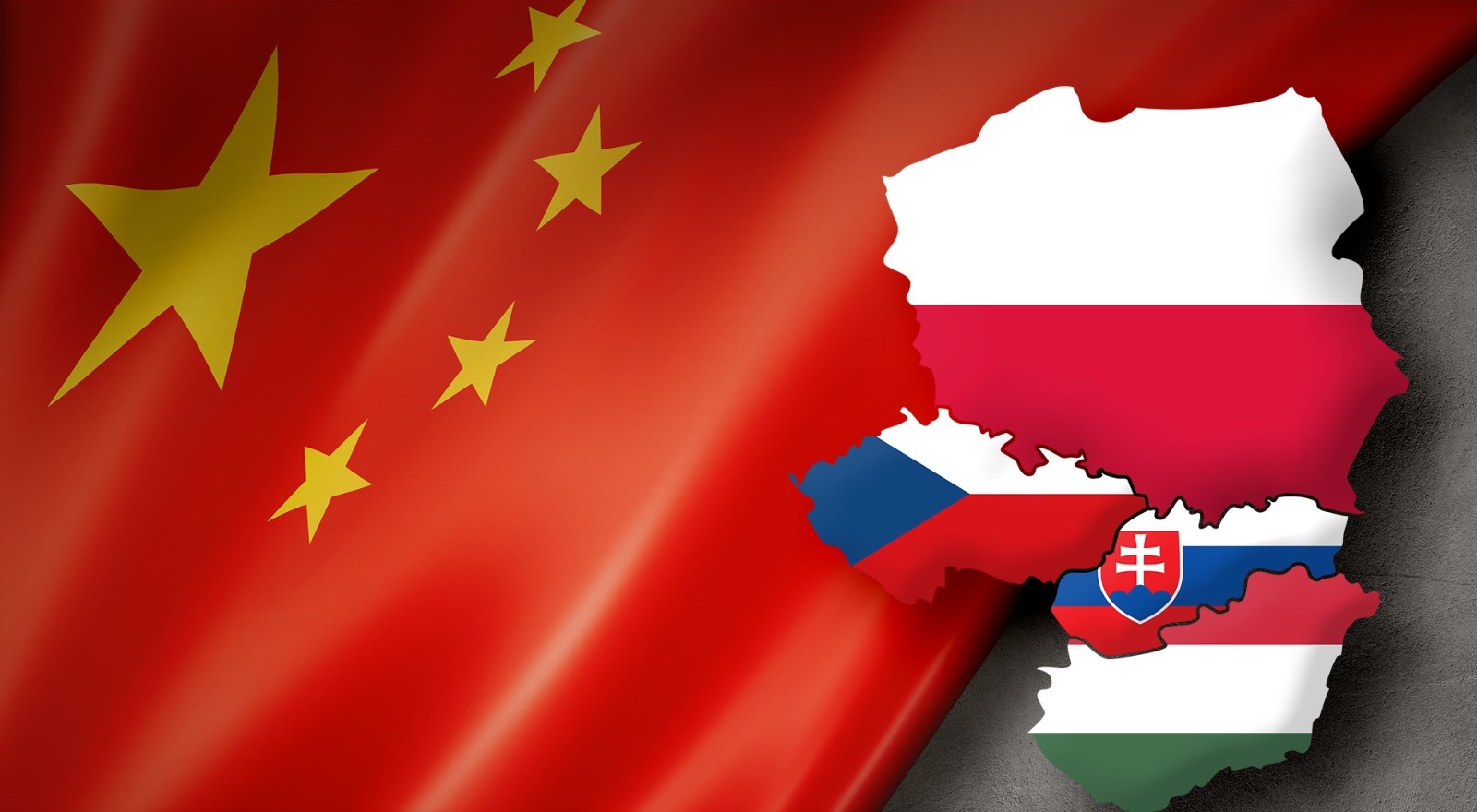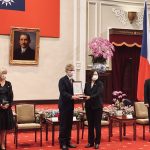
THE ROLE AND INFLUENCE OF THE PEOPLE’S REPUBLIC OF CHINA ON VISEGRAD GROUP COUNTRIES. The aim of the project is to monitor the activities of the PRC in relation to the V4 countries – Poland, Czechia, Hungary and Slovakia. The project is funded by the International Visegrad Fund.
Date: 23 December 2020
Author: Łukasz Kobierski
Public Opinion on China in European and V4 Countries
The November report “European public opinion on China in the age of COVID-19. Differences and common ground across the continent” prepared by the Central European Institute of Asian Studies (CEIAS), a Slovak think tank, presents interesting data on the attitudes of European citizens, including the members of the Visegrad Group (V4), towards China. The V4 countries are more or less in the middle of the ranking and its citizens generally have negative opinions about Beijing. However, the public opinion on China has worsened in the case of nearly all European citizens. It is a result of both the COVID-19 pandemic and the so-called “wolf warrior diplomacy,” adopted by Chinese officials.

Poland
In case of Poland, nearly 70% of respondents expressed a negative or neutral attitude towards China. On the other hand, about 60% of the participants of the study stated that they consider trade cooperation and investments with the Middle Kingdom positively, which is the highest score among the V4 countries. The Belt and Road Initiative (BRI) is perceived in a similar way. Only slightly over 30% of respondents stated that we should cooperate with China in the process of building the 5G network. According to 35% of Poles, the perception and image of China has worsened over the last three years, and over 10% believe that it improved.
Slovakia
In Slovakia nearly 70% of respondents indicated a negative or neutral attitude towards China. Approximately 55% of the participants of the study stated that they consider trade cooperation favorably, but investments with the Middle Kingdom were approved by less than half of respondents, similarly to the approval of the BRI. Slightly more than 30% of Slovaks would consider the construction of the 5G network by China as beneficial. According to around 25% of Slovaks, China’s image has deteriorated over the past three years. This is the lowest score among the V4 countries. On the other hand, about 15% of the participants of the study believe that it is better and this is the highest score among the Visegrad countries.
Hungary
Interestingly enough, despite Orban’s cordial relations with the CCP, around 75% of Hungarian respondents have a negative or neutral attitude towards China. Similarly to Slovakia, about 55% of the participants of the study stated that they consider the trade cooperation as good, but less than 50% of them regard the investments with the Middle Kingdom positively. The approval of the BRI remains the same. As far as the construction of the 5G network by the Chinese is concerned, about 35% of Hungarians have a positive attitude towards this idea, which is the highest score among the V4 countries. More than 30% of Hungarians believe that over the past three years the public opinion and image of China has deteriorated and more than 10% think that they have improved.
The Czech Republic
The Czechs showed the greatest hostility towards Beijing because as much as 80% of respondents indicated a negative or neutral attitude towards China. This is also reflected in the perception of trade cooperation with Beijing (slightly positive, more than 50% of all responses) and investments (about 45%). The approval of the Belt and Road initiative is rated similarly, and has the lowest score among the V4 countries. Moreover, the Czechs are the most skeptical about the Chinese proposal to build a 5G network. Only 20% of respondents indicated that it is a good idea. As in previous cases, the Czechs have been at the forefront of the worsening perception of Beijing over the past few years. More than 40% of the respondents from this country believe that China’s image has deteriorated and less than 10% of them think that it is better.
Beijing’s tactics and reactions
The CCP is still building its soft power. According to the estimates, Beijing has been spending about $10 billion a year on this goal in recent years. The incumbent chairman Xi Jinping used the term “tell China’s stories well” (Chinese: 讲好中国故事, jiang hao zhongguo gushi). Terms such as “win-win cooperation” (Chinese: 合作共赢, hezuo gongying) or “peaceful development” (Chinese: 和平发展, heping fazhan) are used in the foreign policy, the sphere of propaganda and diplomacy of the PRC.
Good opinions expressed about the Middle Kingdom forced the authorities of the CCP to take additional actions. On November 8, the Chinese Journalists’ Day, Xi Jinping voiced his expectations regarding this profession in his country. He pointed out that foreign-oriented communication should be improved through the proven methods along with new concepts and expressions that are understood both in China and the rest of the world, “telling the true story of our country and making our voice heard.”
As per usual, the Chinese media have explained why the data collected in the surveys by the Slovak think tank are wrong and unacceptable. One of the arguments was that the negative attitude of other countries is due to the fact that their inhabitants cannot enjoy the achievements of the Chinese in the fight against the coronavirus, because their own governments fail in this field and the media were not presenting the full truth about the events in the Middle Kingdom.
Furthermore, the Western institutions and media were accused of holding the same position as their governments, representing their and Western capitalism’ interests. According to the Chinese media, such opinion polls are motivated politically rather than scientifically. The West cannot stand China’s success in the fight against COVID-19 and is trying to cover up its failures in this field. According to them, the image of the Middle Kingdom has been repeatedly denigrated and anti-Chinese public sentiment has been instigated prior to the research.
Support Us
If content prepared by Warsaw Institute team is useful for you, please support our actions. Donations from private persons are necessary for the continuation of our mission. Support
The main culprit of this state of affairs was, of course, the United States, which controls the global discourse. When the pandemic began to rage in the US, American politicians took up the strategy of holding China accountable for the global pandemic. Such views were described as “anti-intellectual and anti-scientific” and their spread was said to be due to a state of global chaos and dominant populism.
The CCP deliberately applies nationalist rhetoric that is targeted at the domestic recipient. However, its exploitation is associated with the deterioration of public opinion abroad and can become a point of confrontation as well as limit the room for maneuver for PRC diplomacy and business.
Reasons for a low level of public support
The growth of unfavorable views on China among the public opinion of the V4 countries and in Europe should not come as a surprise, especially if we consider 2020. In the media space one could observe multiple negative opinions about the Middle Kingdom. First of all, it is worth noting the poor handling of the COVID-19 pandemic by China in its initial phase and the subsequent accusations of Western countries for the spread of the virus, which occasionally took the form of racist opinions. Another source of negative comments was the new Hong Kong national security law, which de facto led to the loss of autonomy of this special administrative region. Further information that had a negative impact on the perception of Beijing included reports of Uyghur forced labor in Xinjiang and violations of language rights in Inner Mongolia.
In this context it is important to note the so-called “wolf warrior diplomacy” (战狼外交), which is conducted nowadays by Chinese representatives. This new approach seems to be popular in China, especially among the young generation of diplomats, and illustrates the transition of Chinese diplomacy from passive and discreet to assertive, proactive and often aggressive, aiming to defend national interests. Moreover, it should be kept in mind that the current state of affairs is not a result of a sudden process and was not caused only by the COVID-19 pandemic. The abandonment of the Deng Xiaoping strategy (taoguang yanghui, “lay low and bide your time,” literally “hide brightness, cultivate obscurity”) occurred earlier, but to precisely determine that moment, a deeper analysis is required.
China’s soft power worldwide is still weak and, as research shows, the “wolf warrior diplomacy” as well as the COVID-19 pandemic have led to a deterioration of the image of the Middle Kingdom. For instance, in a 2020 study by Pew Research Center, all 14 surveyed countries had an unfavorable view of China. The fewest respondents who shared such opinions were based in Italy (62%) and the most in Japan (86%). The negative opinions of the respondents towards Beijing have reached their highest levels since the 2002 survey in Spain, Germany, Canada, the Netherlands, the United States, the United Kingdom, South Korea, Sweden and Australia.
Summary
As the aforementioned data show, China has lost significant support among the V4 and European societies. The Czech Republic seems to be the leader among the Visegrad countries in this field, while the Slovaks are the least skeptical. Interestingly enough, Poland is quite optimistic about the investment cooperation with Beijing, which does not translate into current actions of the government. On the other hand, Hungary has good diplomatic relations with China, which, nevertheless, do not translate into positive views on the Middle Kingdom among its citizens.
The data presented above and the current situation have many consequences. First of all, it should be expected that politicians can apply a more assertive policy towards Beijing and in the short term it will be difficult to establish friendly relations that could result in investment agreements and a significant increase in trade. Secondly, there will be more criticism of the PRC because politicians will want to make political capital out of it, as is already noticeable in the case of Western countries and gradually our region. Thirdly, if Beijing wants to improve its relations with representatives of our part of Europe, it should change its current approach. The present dynamics indicate, however, that for the time being this should not be expected and the “wolf warrior diplomacy” will be continue. Fourthly, negotiations and signing of the Comprehensive Agreement on Investment (CAI) between the EU and China are in question. Considering the low public support for the PRC, it will be difficult to enforce it. Fifthly, Beijing may intensify disinformation activities in our region, aiming to improve its image and discredit opponents of the Middle Kingdom, as is the case with the USA. Sixthly, China will use the relations established by Chinese business representatives with local politicians and entrepreneurs in our region to establish a friendly ecosystem of cooperation and dependence, in a way bypassing governments. Given China’s potential actions in this area, systemic mechanisms within V4 and the EU should be established to jointly respond to the CCP’s retaliation. Only by staying together, in case of potential problems, we can make our voice heard in the Middle Kingdom and counteract the aggression of the PRC.
This article is a part of the project “The Role and Influence of the People’s Republic of China on Visegrad Group Countries” funded by the International Visegrad Fund.
All texts published by the Warsaw Institute Foundation may be disseminated on the condition that their origin is credited. Images may not be used without permission.


















